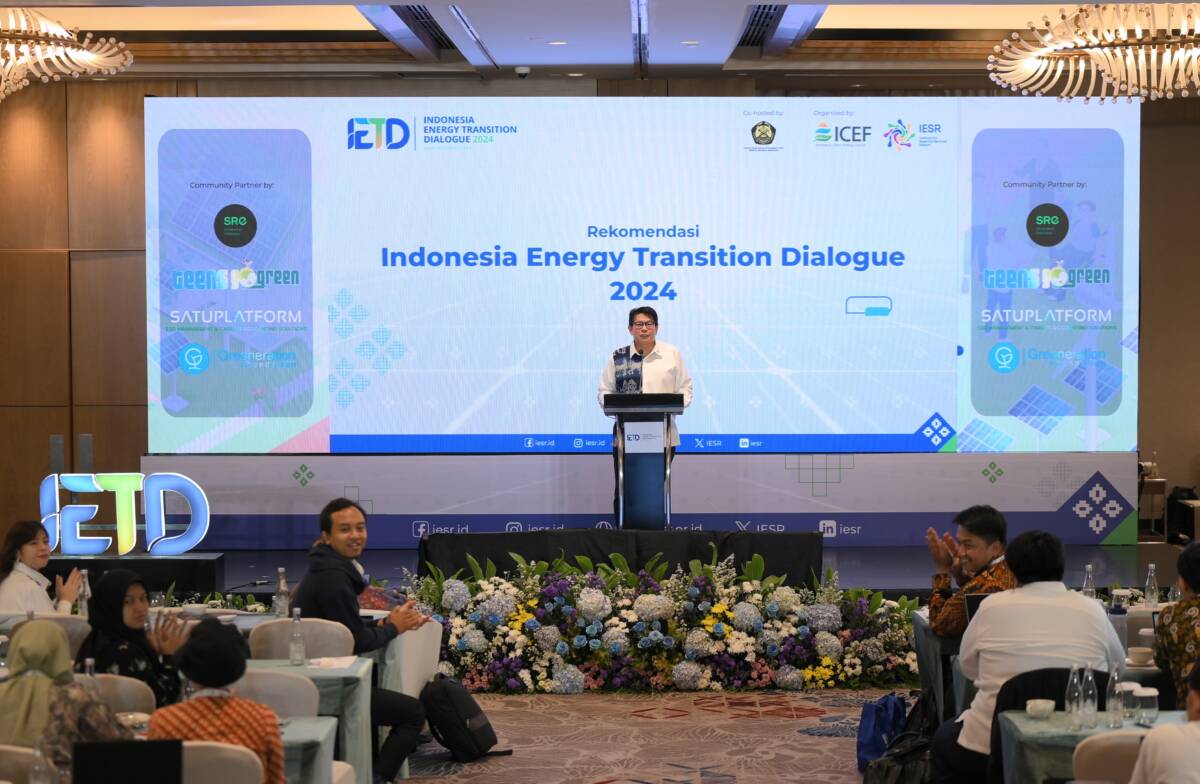Jakarta, 6 November 2024 – The Indonesia Clean Energy Forum (ICEF) and the Institute for Essential Services Reform (IESR) have summarized the discussions from the Indonesia Energy Transition Forum (IETD) 2024 into a set of recommendations for accelerating an equitable energy transition, directed at the Prabowo Subianto-Gibran Rakabuming Raka administration. ICEF and IESR emphasized that the energy transition is crucial for achieving the eight percent economic growth target and supporting global efforts to limit global warming to below 1.5 degrees Celsius. At the close of IETD 2024 (6/11/2024), Fabby Tumiwa, Executive Director of ICEF and IESR, presented five short-term (quick win) recommendations and four long-term recommendations.
In the short term, the government is urged to first set energy transition targets and roadmaps that prioritize cost-effective options, ensure optimal supply reliability, and reduce greenhouse gas emissions in alignment with the 1.5-degree Celsius target.
“The commitment to energy transition must be strengthened by increasing the renewable energy mix target in the National Energy Policy, reinstating the 23 percent target by 2025, and significantly raising the 2030 target. Additionally, the energy transition roadmap should provide transparency on the cost implications of different scenarios, ensuring that decisions reflect the most cost-effective pathway to reach the target,” said Fabby.
Second, accelerating the completion of energy transition policies and regulations currently underway to support Indonesia’s energy transition roadmap. Key policies, including the National Energy Policy (KEN), the National Electricity General Plan (RUKN), the roadmap for phasing out coal-fired power plants, and the Electricity Supply Business Plan (RUPTL), should be finalized within the government’s first 100 days.
Third, reforming energy subsidies and compensation to provide direct social support. Fabby emphasized that the government should establish a dedicated team to develop a strategy for restructuring energy subsidies and compensation to offer direct social support for vulnerable groups and the aspiring middle class.
Fourth, implementing policy reforms in the electricity sector as outlined in the Comprehensive Investment and Policy Plan (CIPP), which prioritizes regulatory adjustments to facilitate investment in the sector. These reforms will also support the implementation of Just Energy Transition Partnership (JETP) funding and additional financing in line with the JETP joint statement.
Fifth, accelerating the de-dieselization program for 5,400 diesel power units (PLTD), totaling 3.5 GW of capacity, by replacing them with local renewable energy sources to secure adequate electricity for tier-3 access (at least 692 kWh per capita annually). Fabby noted that the de-dieselization plan has faced delays over the past three years and requires a clear target for completion. Shifting from diesel to renewables would reduce local electricity generation costs and decrease diesel dependency and imports.
Furthermore, Fabby presented four long-term recommendations. The first is to strengthen energy diplomacy to attract investment and promote technology transfer through South-South cooperation. Indonesia can leverage its strong international relationships to become a global hub for the energy transition.
Second, create an enabling environment that fosters the transformation of industrial and SOE business models during the energy transition.
“The energy transition will drive the transformation of industrial business models and SOEs across sectors, driven by the disruption of increasingly affordable clean energy technology,” said Fabby. He explained that PLN’s role could evolve, shifting from merely buying and selling electricity to providing high-quality energy supply and management services to consumers. Fossil energy companies are diversifying their businesses and investing in clean energy. The government must identify these trends and develop a supportive regulatory framework to create an environment conducive to the transformation of industry business models.
Third, translate clean energy development targets (such as renewable energy and hydrogen) into a roadmap for industrial growth, workforce development, and preparation to support economic progress. For the clean energy sector to thrive, the government should design an incentive package that supports domestic clean energy industry growth. This should include workforce development aligned with necessary competency standards, support for research and innovation in low-carbon technology, and the establishment of critical infrastructure such as electricity grids, energy storage systems, standardization, and testing facilities for clean energy technology.
Fourth, enhance transparency and inclusivity in energy policy-making by engaging a broad range of stakeholders.
“The energy transition impacts various groups, so the strategy and roadmap for the transition must involve all affected actors, including businesses, industries, workers, indigenous communities, youth, academics, women, and the media. Communication channels for energy transition policies should be scheduled and accessible to all stakeholders to ensure widespread engagement.” Fabby said.
The Indonesia Energy Transition Dialogue (IETD) 2024 is organized by the Indonesia Clean Energy Forum (ICEF) and the Institute for Essential Services Reform (IESR), in collaboration with the Ministry of Energy and Mineral Resources (MEMR). The seventh IETD took place from November 4-6, 2024, under the theme “Realizing an Equitable and Orderly Energy Transition.” IETD 2024 featured 11 sessions covering a variety of topics and formats, with contributions from 50 national and international speakers, panelists, and moderators.
See more details of the 9 Recommendations of Indonesia Energy Transition Dialogue 2024 at : See More

